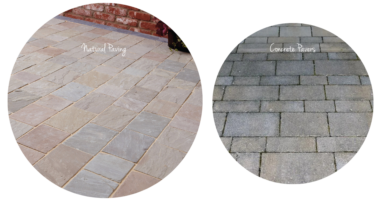Natural Stone vs. Concrete Pavers: What’s the Best Choice for 2025?

When it comes to building a patio, walkway, or driveway that will last, homeowners often face a key question: natural stone vs. concrete pavers—which is better? While both offer pros and cons, the answer in 2025 is becoming clearer. As outdoor living grows in importance, more professionals are turning to natural stone pavers for their durability, timeless design, and environmental benefits.
Let’s break down how natural stone stacks up against concrete in real-world applications like patios, pool decks, and driveways—and why it’s fast becoming the top choice for American homeowners and landscape designers alike.
Durability & Strength
Natural stone is formed over millions of years—meaning it's naturally strong and able to withstand heavy use without the need for synthetic reinforcement. Many of our Indian sandstone pavers and Indian limestone pavers exceed 15,000 PSI, making them ideal for high-traffic outdoor areas.
Concrete pavers, on the other hand, are man-made using cement and aggregate. While strong initially, they tend to deteriorate faster, especially in extreme climates or under UV exposure.
Aesthetics & Design Versatility
Concrete pavers are available in many colors and patterns, but they often fade, chip, or show aggregate over time. Some also mimic natural textures—but never quite match the real thing.
With natural stone, each piece is unique in tone, texture, and veining, delivering a high-end, timeless look that works beautifully across modern, rustic, and classic design styles. From large format pavers for patios to custom coping around pool decks, the design possibilities are elevated.
Maintenance Over Time
Concrete often needs sealing, patching, and cleaning to maintain its appearance. It’s also prone to hairline cracks from temperature fluctuations or ground movement.
Natural stone pavers, when installed correctly, are low maintenance and far more forgiving over time. Paired with a brush-in jointing compound like Pavetuf, you can create a semi-permeable patio system that resists weeds, erosion, and staining—no sealing required.
Environmental Impact
Concrete production is one of the world’s top sources of CO₂ emissions. And many concrete pavers include dyes or chemicals that can leach into the soil.
Natural stone is a recyclable, earth-friendly material with low embodied energy—especially when sourced responsibly. Natural Paving USA only offers ethically quarried, ASTM-tested stone, aligning with modern eco-conscious values and sustainability goals.
Long-Term Value
While concrete is cheaper upfront, the long-term picture tells a different story. Repairs, fading, and replacement costs can add up quickly.
Natural stone may come with a higher initial investment, but it delivers significantly better return on investment through longer lifespan, lower upkeep, and increased resale value—especially on high-end properties.
Upgrade Your Outdoors with Natural Stone Pavers
Whether you’re designing a patio, pool deck, or driveway, natural stone pavers offer unmatched durability, beauty, and long-term value.
Explore our collections today and discover why more homeowners are choosing Natural Paving USA to build better, smarter outdoor spaces.